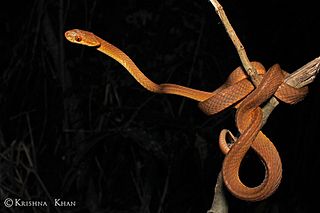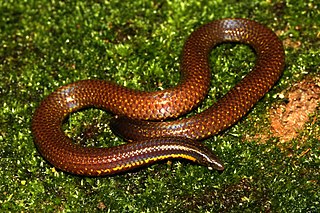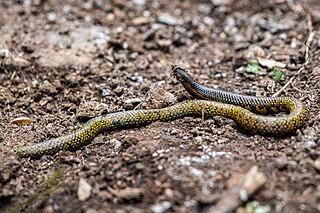
Protobothrops jerdonii, also known commonly as Jerdon's pitviper, the yellow-speckled pit viper, and the oriental pit viper, is a species of venomous snake in the subfamily Crotalinae of the family Viperidae. The species is native to India, Nepal, Myanmar, China, and Vietnam. Three subspecies are recognized, including the nominate subspecies described here.

Trimeresurus medoensis, commonly named the Motuo bamboo pitviper, is a venomous pitviper species endemic to India, Burma, and Tibet. No subspecies are currently recognized.
Blythia reticulata, commonly known as Blyth's reticulate snake, Blyth's reticulated snake, or the iridescent snake, is a species of snake in the subfamily Natricinae of the family Colubridae of the superfamily Colubroidea. The species is endemic to Asia.

Boiga ochracea, commonly called the tawny cat snake, is a species of rear-fanged snake in the family Colubridae. The species is endemic to South Asia.

Wallophis brachyura, known commonly as the Indian smooth snake or suvaro saap, is a species of rare harmless snake in the family Colubridae. The species is endemic to India.
The calamaria reed snake is a species of snake found in some parts of South Asia.
Oligodon woodmasoni, the yellow-striped kukri snake, is a species of snake in the family Colubridae. The species is endemic to the Nicobar Islands of India.
Ptyas nigromarginata, commonly known as the green rat snake or black-bordered rat snake, is a species of snake in the family Colubridae. The species is endemic to Asia.

The flat-tailed house gecko, also known as the frilled house gecko or Asian house gecko, is a species of Gekkonidae native to southeastern and southern Asia. The species is sometimes classified under the genus Cosymbotus.
Platyplectrurus trilineatus, commonly known as the tri-striped shield-tail snake or the lined thorntail snake, is a species of uropeltid snake endemic to the Western Ghats of Southern India. Like most other shieldtail snakes, it is presumed to be a nocturnal, fossorial snake inhabiting evergreen forests. A very rare snake, about which nothing is known in terms of live colouration and natural history.
Uropeltis broughami, commonly known as Brougham's earth snake or the Sirumalai shieldtail, is a species of snake in the family Uropeltidae. The species is endemic to the Western Ghats in southern India.

Uropeltis ellioti, commonly known as Elliot's earth snake and Elliot's shieldtail, is a species of snake in the family Uropeltidae. The species is endemic to India.
Uropeltis macrorhyncha is a species of nonvenomous snake in the family Uropeltidae. The species is endemic to India. There are no subspecies that are recognized as being valid.
Uropeltis petersi, commonly known as Peter's earth snake, Peters' shieldtail, and the shieldtail earth snake, is a species of nonvenomous snake in the family Uropeltidae. The species is endemic to India.

Uropeltis phipsonii, commonly known as Phipson's earth snake and Phipson's shieldtail, is a species of snake in the family Uropeltidae. The species is endemic to India.

Uropeltis pulneyensis, commonly known as the Indian earth snake and the Palni shieldtail, is a species of snake in the family Uropeltidae. The species is endemic to the Western Ghats of India.
Uropeltis rubrolineata is a species of nonvenomous shieldtail snake in the family Uropeltidae. The species is endemic to southern India. There are no subspecies that are recognized as being valid.

Uropeltis woodmasoni, commonly known as Wood-Mason's earth snake or Woodmason's earth snake, is a species of snake in the family Uropeltidae. The species is endemic to India.

The spine-bellied sea snake, also commonly known as Hardwicke's sea snake and Hardwicke's spine-bellied sea snake, is a species of venomous sea snake in the family Elapidae.

Uropeltis shorttii, also known commonly as the Shevaroy Hills earth snake and Shortt's shieldtail snake, is a species of non-venomous snake in the family Uropeltidae. The species is endemic to the southern Eastern Ghats of India. This species was first described as Silybura shorttii by British naturalist Richard Henry Beddome in 1863. It is found only in the Shevaroy Hills of Salem district in Tamil Nadu state in South India. For a long time, this species was misclassified into Uropeltis ceylanica, a snake endemic to the Western Ghats, till a recent taxonomic study proved it to be a distinct species with a very narrow geographic range. It is a burrowing snake, presumed to be nocturnal, feeding on soft-bodied worms. It becomes active during the rains. U. shorttii has most recently been assessed for The IUCN Red List of Threatened Species in 2019, and is listed as "Critically Endangered" under criteria B1ab(iii).











